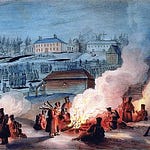A good friend of mine, a Jewish fellow, once said to me that the Hebrew language is quite primitive. “It’s all verbs,” he said. He had a point, though the Hebrew verb can be quite versatile, with its seven voices or aspects (and you think you have trouble teaching kids about active and passive!). There aren’t many adjectives and adverbs in Hebrew, and there are very few prefixes — no real suffixes — that can make twenty words out of a single one, as Latin and Greek do, and as English does, because we in English are rapacious that way. We not only borrow words; we borrow other languages’ ways of making new words. Anyway, the Hebrew noun for our Word of the Week, fruit, is pretty much the same as the Hebrew verb, so that when God says to the first man and woman, “Be fruitful and multiply,” it’s just a very quick verb and verb pair, with each verb being like an elemental block of meaning: P’ru w’rvu, as if he’d commanded, “Fruit! Many!” And of course, fruit is an important motif in those first two chapters. The trees bear seeds in their fruit, after their kinds; and God gives to Adam and Eve the fruit of every tree in the garden to eat, except the one — well, that is another story. But the point is that God fills the world with fruit, and it is good, and we ourselves are to bear fruit. Remember the fig tree full of glossy green leaves but no fruit? Don’t be like that tree.
Which fruits are good to eat? If you look at a mushroom whose like you’ve never seen before, there’s no way you can tell. But I think that fruit is different. One day in September, in Nova Scotia, I was walking along with my dog Jasper — the genius who did more than seventy tricks. He was snuffling in the bushes, and before I could stop him, he’d plucked off a blue-black berry and eaten it. I looked at it. It wasn’t any kind of blueberry or huckleberry. I did have an idea of what it might be, but I wasn’t sure. I crushed one between my fingers and smelled the red-purple juice. It smelled fruity and sweet. So I ate one, and it was good. My guess, by the way, was right: they were bilberries, and in fact they’re quite good for you, full of all those berry-nutrients that help keep away some of our worst diseases.
One of the ladies at church this Sunday brought in a basket of small yellow and pink peaches she’d picked from her tree, and of course I ate a couple of them — there is not a fruit I know of that I don’t like, and I reckon I’ve eaten about 25 different kinds of berries and fruits right off the bush or the tree, including cloudberries (what the old-timers in our part of Nova Scotia call bakeapples, because the flavor is like that, though they’re really in the blackberry and raspberry family), lemons, pomegranates, lychees, chokecherries, and you name it. But that got me to thinking about some of the names for our fruits. Peach, for instance, comes into English from French (and so did the fruit itself), and the French got it from Latin, and the Romans got it from Greek, and the Greeks got it from Persia — the fruit, that is. They called it the malon persikon, the Persian apple. Hence the word peach comes from the name of the land of its origin.
Orange is another voyager. The word comes from Sanskrit naranga, naming the tree and the fruit; it’s not an original Indo-European word, because our ancient ancestors lived on the steppes of Russia, and oranges don’t grow there, that’s for sure. So the word and maybe the fruit also traveled from India to Persia, and from Persia to the rest of the Arab world: Arabic naranj. Now, here’s another case of faulty separation, which I’ve mentioned before: it happens when people stick the end of one word onto the beginning of the word that follows it, or the other way around, sticking the beginning of one word onto the end of the word coming before. So an Italian speaker, in that same Mediterranean world with the Arabs, heard naranj as un’ aranj, an orange (tree), detaching the initial n and hearing it as the end of the word for an, one. From Italian arancia it passed into French and was influenced by the place name Orange, which is unrelated, and then into English. Oranges were pretty well known in southern Europe in the Middle Ages, and made their way into England on merchant ships, along with spices and other fruit that won’t grow that far north. If you’re wondering, it was Juan Ponce de Leon who brought the first oranges to Florida.
The general word for a fruit in Old English was aeppel, our word apple, and it often denoted anything that was round and solid: hence the Adam’s apple, that round bump in a man’s throat that is just the effect of a larger and thicker larynx. So when old texts say that Adam and Eve ate the apple, it didn’t necessary mean that it was an apple; Chaucer seems of the common opinion that it was a kind of pear. But the word fruit, coming to us from the Norman French (like suit), took over the general meaning, and left apple to the specific sort of fruit a little boy used to bring to his favorite lady teacher in school. And what about the word fruit? It’s from Latin fructus, itself from the verb frui, to enjoy. That word does have a cousin in English, through the Germanic line. Indo-European bh became f in Latin, but it became b in the Germanic languages (see, for example, Latin frater, but English brother; Latin flare, but English blow, bloom). So there’s an Old English verb that meant to enjoy: brucan. From that we get the word brook, not the stream, but a verb that survives only in the negative. When you say, “I’ll brook no opposition,” you’re saying you won’t put up with it; but originally, you won’t enjoy it.
But the Japanese plums will be ripening soon — and those I do enjoy!
Word & Song by Anthony Esolen is an online magazine devoted to reclaiming the good, the beautiful, and the true. We publish six essays each week, on words, classic hymns, poems, films, and popular songs, as well a weekly podcast for paid subscribers, alternately Poetry Aloud or Anthony Esolen Speaks. Paid subscribers also receive audio-enhanced posts and on-demand access to our full archive, and may add their comments to our posts and discussions. To support this project, please join us as a free or paid subscriber. We value all of our subscribers, and we thank you for reading Word and Song!













